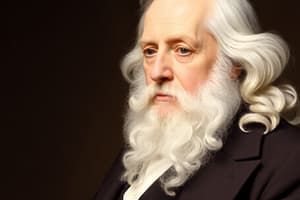Podcast
Questions and Answers
What does the Greatest Happiness Principle assert in utilitarianism?
What does the Greatest Happiness Principle assert in utilitarianism?
- The right action should always favor lower pleasures.
- The right action produces happiness for as many as possible. (correct)
- The right action must be performed with good intentions.
- The right action is one that respects individual rights.
Which philosopher is known as the founder of utilitarianism?
Which philosopher is known as the founder of utilitarianism?
- Jeremy Bentham (correct)
- John Stuart Mill
- Immanuel Kant
- Friedrich Nietzsche
What distinguishes Act Utilitarianism from Rule Utilitarianism?
What distinguishes Act Utilitarianism from Rule Utilitarianism?
- Rule Utilitarianism considers the consequences of individual actions.
- Act Utilitarianism assesses each action on a case-by-case basis. (correct)
- Rule Utilitarianism disregards overall societal welfare.
- Act Utilitarianism evaluates actions based on general rules.
What is a major criticism of utilitarianism regarding justice?
What is a major criticism of utilitarianism regarding justice?
Which thinker emphasized qualitative differences in pleasures within utilitarianism?
Which thinker emphasized qualitative differences in pleasures within utilitarianism?
What does the term 'utility' refer to in the context of utilitarianism?
What does the term 'utility' refer to in the context of utilitarianism?
What is a common application of utilitarian analysis?
What is a common application of utilitarian analysis?
What does utilitarianism primarily focus on when evaluating actions?
What does utilitarianism primarily focus on when evaluating actions?
Flashcards are hidden until you start studying
Study Notes
Political Theory: Utilitarianism
-
Definition:
- Utilitarianism is a consequentialist ethical theory that promotes actions that maximize happiness and well-being for the majority.
-
Key Principles:
- Greatest Happiness Principle: The right action is the one that produces the greatest happiness for the greatest number.
- Utility: Refers to the overall well-being or happiness produced by an action.
- Consequentialism: Focus on the outcomes of actions rather than intentions or intrinsic qualities.
-
Major Thinkers:
- Jeremy Bentham:
- Founder of utilitarianism.
- Introduced the idea of measuring pleasure and pain through a "hedonic calculus."
- Advocated for legal and social reforms based on utilitarian principles.
- John Stuart Mill:
- Expanded Bentham’s ideas, emphasizing qualitative differences in pleasures.
- Distinguished between higher (intellectual) and lower (bodily) pleasures.
- Advocated for individual rights and liberties as essential to overall happiness.
- Jeremy Bentham:
-
Forms of Utilitarianism:
- Act Utilitarianism: Evaluates individual actions based on their consequences; each action is assessed on a case-by-case basis.
- Rule Utilitarianism: Focuses on the adherence to rules that generally promote the greatest good; rules are justified by their overall utility.
-
Critiques:
- Impartiality: May overlook justice and individual rights for the sake of collective good.
- Measurement Issues: Difficulty in quantifying happiness and comparing different individuals' utilities.
- Moral Dilemmas: Can lead to conclusions that seem morally questionable (e.g., sacrificing one for many).
- Neglect of Intentions: Critics argue that intentions behind actions should also matter ethically.
-
Applications:
- Influences public policy, economics, and ethical decision-making.
- Utilitarian analysis is used in welfare economics to evaluate social programs and interventions.
-
Contemporary Relevance:
- Continues to inform debates on issues like healthcare, environmental policy, and animal rights.
- Engages with modern dilemmas in technology and bioethics, balancing innovation with societal welfare.
Definition and Key Principles
- Utilitarianism is a consequentialist ethical theory aiming to maximize happiness and well-being for the majority.
- The Greatest Happiness Principle states that the right action is the one producing the greatest happiness for the most people.
- Utility refers to overall well-being or happiness generated by an action.
- Consequentialism emphasizes evaluating actions based solely on their outcomes rather than intentions or properties.
Major Thinkers
- Jeremy Bentham:
- Credited as the founder of utilitarianism.
- Introduced a "hedonic calculus" to measure pleasure and pain, advocating for social reforms grounded in utilitarian principles.
- John Stuart Mill:
- Built on Bentham’s framework by highlighting qualitative differences in pleasures.
- Differentiated between higher (intellectual) and lower (bodily) pleasures.
- Advocated for individual rights and liberties as crucial for maximized happiness.
Forms of Utilitarianism
- Act Utilitarianism: Assesses individual actions based on their specific consequences, evaluating each case uniquely.
- Rule Utilitarianism: Centers on following rules that generally promote the greatest good, justifying rules by their overall utility.
Critiques
- Impartiality: Criticized for potentially sidelining justice and individual rights in favor of collective happiness.
- Measurement Issues: Challenges arise in quantifying happiness and comparing utility among individuals.
- Moral Dilemmas: Can lead to morally questionable outcomes, such as sacrificing one for the benefit of many.
- Neglect of Intentions: Critics argue that ethical evaluations should also consider the intentions behind actions.
Applications
- Utilitarianism significantly influences public policy, economics, and ethical decision-making processes.
- Employed in welfare economics as a framework for evaluating the effectiveness of social programs and interventions.
Contemporary Relevance
- Continues to play a role in discussions regarding healthcare, environmental policies, and animal rights.
- Addresses modern dilemmas such as technological advancements and bioethics, balancing innovation with societal welfare considerations.
Studying That Suits You
Use AI to generate personalized quizzes and flashcards to suit your learning preferences.




